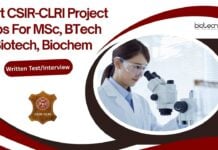ACTREC MSc Vacancy Project JRF For Life Sciences – Attend Walk-In
ACTREC Scientific Officer Job ACTREC MSc Vacancy Scientific Officer – Attend Walk-In. Scientific Officer Life Sciences Job. MSc Life Sciences Scientific Officer job opening at ACTREC. Interested and eligible applicants can check out all of the details on the same below
TATA MEMORIAL CENTRE
ADVANCED CENTRE FOR TREATMENT, RESEARCH AND EDUCATION IN CANCER (ACTREC)
{A Grant-in-Aid Institution of the Department of Atomic Energy, Government of India)
No. ACTREC/ADVT. 108/2023 August 21, 2023
WALK – IN INTERVIEW
Job Title: SCIENTIFIC OFFICER (CANCER GENETICS & GENOMICS LAB)
On Ad-hoc Basis
Interview Date / Day ~~: 08/09/2023 (FRIDAY)
Venue. Paymaster Shodhika,
Administration Department, Room No. PS-331,
Advanced Centre for Treatment, Research and Education Centre {ACTREC),
Sector-22, Kharghar, Navi Mumbai — 410 210.
Reporting Time 10.00 AM to 10.30 AM
Qualification: M.Tech / M.Sc or equivalent degree in Life Sciences / Biotechnology / Zoology/ Genetics / Biochemistry / Molecular Biology / Microbiology and allied field.
Experience. Candidates should have minimum one year hands on experience in NGS wet lab and basic knowledge of human cancer genetics.
Age © Below 35 years as on 08/09/2023.
Consolidated Salary: Rs. 50,000/- p.m.
Duration : Initially for
the period of 06 months { extendable as per requirement of theCentre)
Candidates fulfilling above requirements may appear for Walk-In Interview along with Bio-data, recent passport size photograph, scanned copies of Aadhar Card, PAN CARD, Educational qualification certificates and Working experience certificates at above venue within reporting time only.
Shraddha V. Deshmukh
Assistant Administrative Officer (HRD),
ACTREC
View Main Notification Below
Here are 5 possible interview questions along with their answers for the given job description:
Question 1: Can you explain your experience in experimental biology and how it relates to the techniques mentioned in the job description? Answer: Certainly. I have hands-on experience in various experimental techniques, including mammalian tissue culture handling, gene cloning and expression, transient transfections, lentivirus production, stable gene expression and knock-down, cell viability assays, Western-blot analysis, QPCR, and immunofluorescence staining. My practical familiarity with these techniques has been gained through both academic coursework and hands-on laboratory work.
Question 2: Could you provide an example of a project where you effectively utilized cell viability assays and Western-blot analysis? Answer: Of course. In a previous project, I was investigating the impact of a novel drug candidate on cancer cell viability. I conducted cell viability assays to assess the drug’s effect on cell survival. Additionally, I employed Western-blot analysis to evaluate changes in key protein expression levels in response to the treatment, helping to uncover potential mechanisms underlying the drug’s activity.
Question 3: How comfortable are you with using lentivirus production for stable gene expression and knock-down? Can you elaborate on your experience in this area? Answer: I am quite comfortable with lentivirus production and its applications. In my master’s research, I designed and executed experiments involving lentivirus-mediated stable gene expression and knock-down in specific cell lines. This approach allowed me to investigate gene functions and their impact on cellular pathways, contributing to a deeper understanding of cellular processes.
Question 4: Have you worked with animal models such as mice? Could you discuss your experience with mice modelling and tissue-based analysis? Answer: Yes, I have experience with mice modelling. During my research project, I developed and managed a mouse model to study the effects of a certain treatment on tumour growth. I conducted tissue-based analysis, extracting and analyzing relevant tissues for changes in gene expression and other molecular markers. This experience provided valuable insights into translating in vitro findings to in vivo scenarios.
Question 5: Can you share details about any research articles you’ve published related to the techniques mentioned in the job description? Answer: Certainly. I have authored a research article that focuses on the role of a specific gene in breast cancer progression. In this study, I applied techniques such as gene cloning, QPCR, and immunofluorescence staining to investigate the gene’s expression patterns in cancer cells. The article contributes to the understanding of breast cancer biology and highlights my proficiency in these techniques.
Remember, these answers are designed to provide a general idea of how to respond to the interview questions. Candidates should tailor their answers to their own experiences and accomplishments.
Editor’s Note: ACTREC Scientific Officer Job – Attend Walk-In. Please ensure you are subscribed to the Biotecnika Times Newsletter and our YouTube channel to be notified of the latest industry news. Follow us on social media like Twitter, Telegram, Facebook


































